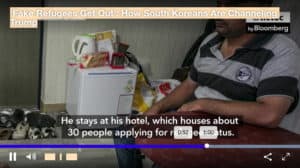‘Fake Refugees Get Out’: How South Koreans Are Channeling Trump
Jihye Lee, Bloomberg News, June 28, 2018
On the South Korean island of Jeju, a tourist hotspot famed for blue waters and sandy beaches, Lee Hyang is angry.
The target of her wrath? More than 500 asylum seekers from war-torn Yemen looking for a safe place to live and work.
Lee, who leads a local group demanding the Yemeni nationals be deported, believes outsiders compete for jobs and pose a threat to local safety. The refugees she saw at the immigration center looked “really scary,” she said. She praised the U.S. president, who won a victory this week when the Supreme Court upheld his ban on visitors from seven countries, including Yemen.
“Donald Trump is a true patriot,” Lee said. “He says, ‘America First,’ and really puts his people first. That’s what our president should do too, instead of thinking of other people like these Yemenis.”
The asylum seekers in Jeju have sparked an uproar in South Korea, {snip}. One group opposed to letting them stay has posters describing the Yemenis as “fake refugees” and urging them to “get out.” An online petition calling for their dismissal has been signed by more than half a million people over the past 15 days.
{snip} The government was giving out work permits in sectors where locals won’t lose jobs, such as agriculture or stock breeding, and was helping with food and medical services while also tightening security measures, government spokesman Kim Eui-keom told reporters this month.
{snip}
‘We Don’t Look Like Them’
{snip}
Algithi and about 30 other Yemeni men are staying at the Olle Tourist Hotel, a narrow building sandwiched between a small convenience store and a run-down karaoke room. As many as six of them usually cram into a room. On Thursday morning, the entrance was packed with young men chatting with hotel manager Park Min-jung, whom they call “Umma,” or mom.
{snip}
The Yemeni arrivals flooded into Jeju because of the tourist destination’s policy of allowing foreigners visa-free entry for as many as 30 days. Many arrived from Malaysia, after the expiration of a 90-day no-visa stay there. A new direct flight to Jeju from the Malaysian capital of Kuala Lumpur helped.
The Yemenis are fleeing what the United Nations has called “the worst man-made humanitarian crisis of our time.” Yemen has been ravaged by a three-year civil conflict that has the country fighting a growing cholera epidemic and veering toward famine.
{snip}
“The Trump administration’s anti-immigration policy has been used as an excuse for many conservative factions opposing those seeking asylum in Korea,” said Shin He-inn, senior public information associate at UNHCR-Korea. “They use it as a reason to say, ‘Look America’s not doing this, Europe’s not doing this, why should we?’ — and that’s misleading. Worldwide, countries accept hundreds and thousands of refugees each year.”
One of the Yemenis in Jeju, Abdo Ahmed, said he and others picked South Korea because of their familiarity with Korean cars, dramas and music.
“My country is devastated: there is no water services, electricity, communication, and 80 percent of the population is below the poverty line,” Ahmed said. “I only have one meal every 24 hours.”
Not all Koreans are pushing back. Ahmed said they’ve received help with food and accommodation from churches, American and Canadian activists, Jeju residents and others in South Korea. One lawmaker with Moon’s Democratic Party, Park Ju-min, introduced legislation to protect the asylum seekers for at least a year while their applications are processed.
Most of the arrivals have filed asylum petitions — 504 males and 45 females so far — and are waiting to hear back from the government. {snip}
{snip}
Koreans aren’t used to people with different customs and cultures “because all we know is us,” said Shin Kang-hyob, an activist at the Jeju NGO Network for Refugee Rights. “We’ve been getting complaints from local residents that we’re helping criminals. They keep calling them ‘fake refugees’ without bothering to hear their story.”
{snip}
“They’re not only a threat to our people, but they’re also a threat to our future generation, because of our youth unemployment issue,” Lee said. “They’re not even real refugees. If they were women or babies, I would believe them, but they’re able-bodied men. They’re fake, like fake news.”

Yemeni refugee in his hotel room.















